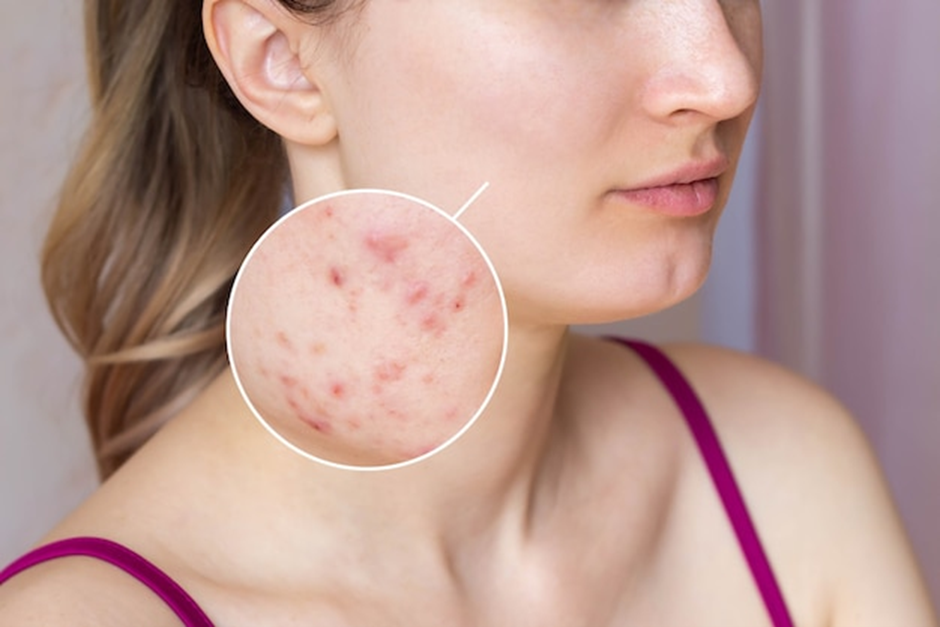Acne is more than just a skin problem; it affects our confidence and overall well-being. Preventing black pimples on the face and promoting sustainable skincare routines can significantly enhance our quality of life. Dealing with pimples on face can sometimes feel overwhelming, but understanding the root causes and solutions can help. Let’s dive deeper into the connection between our skin health and lifestyle.
Understanding and Recognizing Acne
Acne emerges due to several factors. Hormonal changes, particularly hormonal pimples and pimples during pregnancy, are common culprits. Genetics also play a significant role in how our skin reacts. Misunderstandings about acne abound; it’s not always about cleanliness. Recognizing the types of pimples on face – from little bumps on face to black pimples on face – helps in deciding treatment paths. Understanding these elements is a crucial step in managing skin health and finding sustainable solutions.
Developing a Daily Skincare Routine
Crafting a daily skincare routine is essential. Start with gentle cleansing and moisturizing. Using harsh products can make pimples on face worse. Always go for products that suit your skin type and emphasize eco-friendly choices. When selecting products, consider those enriched with natural ingredients and free from harmful chemicals. Investing in brands that use sustainable practices contributes to the health of your skin and the planet.
Link Between Diet, Lifestyle and Acne
Diet and lifestyle massively impact acne. Foods high in sugar and dairy might trigger hormonal pimples. Instead, focus on eating fresh fruits, vegetables, and whole grains. These foods promote clear skin. Keeping hydrated by drinking plenty of water ensures your skin stays supple. Stress is another factor that can worsen little bumps on face, so managing it is essential. Incorporate regular exercise into your routine as it helps detoxify the skin and boost mood.
Addressing Environmental Impacts on Skin
Environmental factors like pollution and harsh weather can worsen black pimples on face. Protect your skin by using products that form a barrier against pollution. Sun protection is critical, too. Always use a broad-spectrum sunscreen daily. It helps prevent damage and premature aging while keeping pimples on face at bay.
Choosing Eco-Friendly Skincare Products
When looking for skincare products, opt for sustainable options. Look for organic ingredients, minimal packaging, and cruelty-free certifications. Some reliable eco-conscious brands focus on providing effective solutions for types of pimples on face while prioritizing the environment. These brands often use biodegradable materials and plant-based ingredients.
DIY Skincare and Reducing Waste
Embrace simple homemade remedies, such as using aloe vera or tea tree oil, for healthier skin. These natural ingredients can be effective in reducing little bumps on face. Utilize zero-waste alternatives, like reusable cotton pads and biodegradable packaging, to minimize environmental impact. Every small change contributes to a larger, positive environmental footprint.
Efficacy of Natural Remedies
Natural remedies can be very effective. Tea tree oil, for instance, helps clear pimples on face, while aloe vera is known for its soothing properties. Green tea is also beneficial for reducing inflammation. Still, it’s important to know when to turn to over-the-counter treatments, especially if natural solutions aren’t enough. Products with ingredients like benzoyl peroxide can help, but consult with a professional if unsure.
Time to Seek Professional Support
When simple strategies aren’t effective, or if your acne significantly affects your life, it’s time to consult a dermatologist. Watch for signs like persistent hormonal pimples or severe breakouts that don’t improve. Dermatologists provide valuable insights and tailor treatments for your specific needs, ensuring safe and effective skin health management.
The Role of Exercise and Stress Management
Regular exercise not only benefits your body but also your skin. It encourages blood circulation, which aids in skin regeneration. Additionally, engaging in stress-reducing activities such as yoga and meditation can significantly reduce stress-induced pimples on face. Incorporate mindfulness into your daily routine to support both mental health and glowing skin.
The Importance of Sleep and Rest
Adequate sleep helps the skin repair and rejuvenate. There’s a direct link between quality sleep and clearer skin, as tiredness often leads to visible wear. Establish a consistent sleep schedule, avoid screens before bed, and create a relaxing evening routine to improve sleep quality, fostering a conducive environment for skin recovery.
Conclusion
Remember, working towards clear and healthy skin is a journey. By implementing a sustainable skincare routine and addressing factors like diet and environment, managing acne becomes more achievable. Embrace eco-conscious choices, and don’t shy away from reaching out to professionals. Your skin’s health contributes to your happiness, so take these steps towards a holistic, sustainable approach. Implement these insights, and watch your confidence and skin health bloom.

